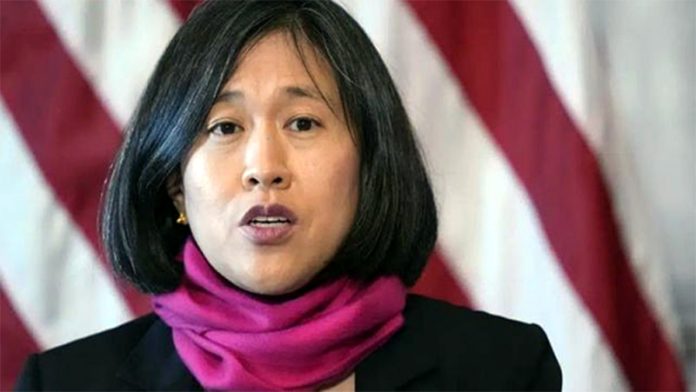BEIJING, Mar 2 : US Trade Representative Katherine Tai has said that China’s economic development system is creating “many competitive pressures” in the world and termed the steep decline in US-China bilateral trade last year as a positive indication for the diversification of global trade.
When the WTO was founded the economies of the world were different. “The economies have since then grown. China is a good example. It joined the WTO in 2001, it was smaller in footprint than it is today”, Tai told BBC in an interview.
In her address to the World Trade Organisation’s (WTO) meeting in Abu Dhabi too, Tai said, “China’s economic development is creating many competitive pressures around the world,” and added the institution was “showing its age” and needed to be reformed so that it could do more to address those pressures.
“We need to address in the WTO the competitive economic pressures that many of us are feeling in the global economy because of the economic and trade footprint of China and its particular system,” she said.
“Yes, that is something we absolutely need to do. That is part of the WTO reform project which is why the WTO is here to serve the interests of all its members large and small,” she said.
Tai said the steep drop in the US trade with China in 2023 could be a positive development.
The American imports of Chinese goods last year totalled USD 427 billion, a 20 per cent drop, according to the US Commerce Department data.
The US exports to China too dropped to about four per cent in 2023 to nearly USD 148 billion. Given this, the trade deficit dropped to USD 279 billion.
As a result, China may lose its position as the top exporting country to the US for the first time in 17 years.
It is the biggest slump in the US-China trade since the Customs started its records in 1995 and the decline is more than either during the global financial crisis of 2008-09 or the start of the US-China trade war in 2018-19, the Hong Kong-based South China Morning Post reported.
Amid growing tensions between the two countries, trade expert William Reinsch of the Centre for Strategic and International Studies said: “Last year’s decline in US-China trade does appear to be a sign that both economies are moving away from each other.”
“But if you look at the increased imports from Southeast Asia into the United States, it appears that a good part of that increase is coming from Chinese companies that have either moved production or are simply moving their products through third countries in order to circumvent tariffs or other restrictions,” he told the Post.
Ahead of the meeting in Abu Dhabi, the WTO Director-General Dr Ngozi Okonjo-Iweala told the BBC that the body was trying to help the US and China solve some of their differences.
Both countries are trying to grow their economic influence in parts of Africa and Asia as they try to secure access to natural resources and build resilience into supply chains.
It has led to growing concerns that the world is splitting into two trading blocs and Dr Okonjo-Iweala warned that “we should be very careful because if this continues, it could do real damage to the world economy.”
A WTO study found such a division could cost the world economy five per cent of its GDP. At a time when growth is struggling because of higher interest rates and inflation, she says, “That is huge.” (PTI)
Trending Now
E-Paper


